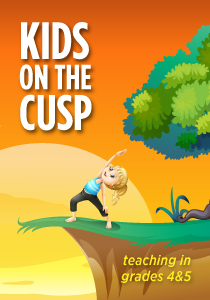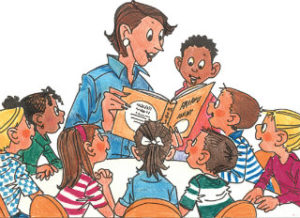Teaching 4th Grade: What I Wish I’d Known
A MiddleWeb Blog
 A few days ago, I was given a moment to observe my teaching from outside of it. The room was full of chatter as our end-of-year book clubs met to discuss the novels they were reading, share insights into the characters they’d encountered, and make connections with them as well as with each other.
A few days ago, I was given a moment to observe my teaching from outside of it. The room was full of chatter as our end-of-year book clubs met to discuss the novels they were reading, share insights into the characters they’d encountered, and make connections with them as well as with each other.
I am so glad I took that time – that moment – to stop and look.
It occurred to me, right then and there, that my fourth graders didn’t really need my guidance for this portion of their day anymore. They were in the zone, having earnest and thoughtful discussions. This was quite a different workshop than we’d had in our first few months of school together. Months, mind you, not weeks.
Time takes time. It’s frustrating, but that doesn’t mean it isn’t completely true.
Here, in the dwindling days of school, after spending close to 180 days together, we were quite a different group of learners than we’d been back in September. We had developed and changed.
As each year comes to a close, as our time together runs out, the teacher in me is not only reflecting on years past, but already planning a bit for the upcoming school year. Summertime gives me time to think back, as well as plan ahead.
Thankfully, summertime offers me a slower pace and lets me ask myself questions, to think about how I got from there to here.
What I’d tell my first-year self
My first days as a teacher in 1998 are a far cry from the scene I witnessed in today’s Room 4T. And, like the evolution in our workshop sessions, it didn’t happen overnight.
What advice would I have given myself when I first began my career as a teacher? First and foremost, I would tell myself to slow down. Time can be a fierce enemy.
I wish there was a way to calculate how much time was spent back then, worrying that there would never be enough time to fit it all in. I wish I’d known back then that there never will be enough time. I wish I’d known then that that’s okay. I have yet to meet a teacher who has been able to “fit it all in.” It is not something that can be fit into a perfectly scheduled time frame.
The clock, however, is an integral part of the school day. Gym, Music, Art, assemblies, and various and sundry other school events add to the time dilemma of fitting it all in. The art of the clock, the ability to sense how many instructional minutes have passed, and to monitor and adjust accordingly, also takes time to develop.
After 20 years, I still look up once in a while and think, “Crap, we’re late for gym.” (Thankfully, the ability to not say “crap” out loud was an innate skill from day one.)
Taking time to observe
Don, our Phys Ed teacher, deserves to have his classes arrive on time. Most days (the days when I’m not saying, “Crap” in my head) we do.
In the years I’ve been teaching with Don, I can’t actually remember a time when I didn’t see him apply the classic technique of instruction known as closure. When Don is out of time, he somehow makes time to wrap it up, and prepare the kids for the next chunk of our daily schedule – the part that is tied to the clock.
Some days Don has more time than others to review defensive strategies or share world records for track and field events. But he always gives the kids a bit of time to share their observations and experiences. Don uses his time well.
And the time I spend in those few minutes, sitting on the gym floor with them or leaning against a basketball hoop, is time well spent. These few moments give me tiny tidbits of information that I can use in my own teaching.

And knowing how obsessed Liam is with baseball statistics, along with the fact that he has a penchant for mental math, allows me to keep him engaged. As a new teacher, my inability to recognize the value of these unscheduled, teachable moments was the result of my obsessing on the clock and keeping to our daily schedule. It’s a delicate balance.
Keeping Fridays open
One thing I’d wish I’d done back then was to keep Fridays open, planning Mondays through Thursdays only, and leaving Fridays flexible, or as my friend Chrissy describes them as, “ripe with epiphany.”
As a new teacher, I hadn’t developed the capacity to see how many objectives could realistically be met in one teaching day. I would plan eight daily learning objectives when only six of them might possibly be met. My discovery of “Blank Fridays” gave me a way to harness the madness and get things back in perspective, if ever so slightly.
Thankfully, I had the freedom to do this. I wasn’t required to spend my time looking up the CCCS numbers that correlated to each lesson objective (Chrissy also coined the phrase, “simple jackassery.”)
To this day, our Fridays are never blank. We use our time well on Fridays.
Reading together
The second insight I would share with my former self is that there is possibly nothing more valuable than reading with your class. Like those small moments in the gym, reading together has become an integral part of getting to know my learners. Again, this takes time…large chunks of time!

Today, we gather on the rug at 12:30. Some days, we’re done by 1:00. Other days, I cave, and we read until 1:15. Either way, we respond to what we’ve read, somehow. There will still be time for Math, Science, and Social Studies. Never enough time, mind you, but time enough. Time takes time.
The teacher that I was would never have spent an hour and a half each day, reading, writing, and reflecting with her class. The teacher I was didn’t truly know the importance of taking the time to gather those tidbits of student insights and experiences.
Making time an ally
The wisdom gained with experience can be used across the curriculum. The best thing I can do as an educator is to use time well. Time can be a fierce enemy….or it can be a strong ally. The choice is mine.
This summer, I plan on making the time to get inspired, to read the latest selection for next year’s Global Read-Aloud, and to prepare for next year’s 4-T. This summer, I will give myself the sunny, shiny gift of time.
Here are some links for those Not-So-Lazy Days of Summer:
BrainyQuote (Whole buncha quotes about time)
BrainyQuote 2 (Quotes about teachers)
Treasures Resources (Free resources by teachers for teachers)
Scripted Minilessons (More teachers helping teachers)
Read and Write Beside Them (Penny Kittle guide to teaching reading and writing)




































